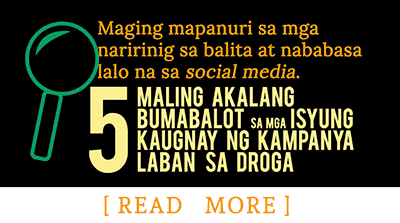Spare the rod, spoil the child, must have been in the mind of President Rodrigo Duterte when he vetoed the passage of the bill banning corporal punishment for children, otherwise known as the “Positive and Non-Violent Discipline of Children Act”. He further claimed that, “I am of the firm conviction that responsible parents can and have administered corporal punishment in a self-restrained manner such that children remember it not as an act of hate or abuse, but a loving act of discipline that desires only their welfare.”
We, from the Philippine Misereor Partnership, Inc. (PMPI), a network of civil society organizations, rights groups, peace and faith-based institutions believe that children should never be bruised, injured, or physically harmed to impose corrective measures. It is disheartening to know that President Duterte flagrantly dismissed the proposed bill despite the United Nations Convention on the Rights of the Child under Article 19, which specifically said that, “The State shall protect the child from all forms of maltreatment by parents or others responsible for the child’s care and shall establish appropriate social programmes for the prevention of abuse and the treatment of victims.”
Vetoing the Positive and Non-Violent Discipline of Children Act by the President himself is a clear act of indifference in ensuring the safety and welfare of children. It shows the President disregard for fairness and prefers physical disciplinary measures. Combined with the President stance of lowering the minimum age for criminal responsibility (MACR), it can be clearly surmised that he lacks the heart and compassion for vulnerable children.
Disciplining children can be done in different ways aside from physical discipline like spanking and other forms of corporal punishment. There are those who believe in discipline, but not in physical discipline such as spanking.
Corporal punishment of children fails to enhance moral character development, nor improve the parents control in the house, neither those adults who adhere to it. It does not make the adults more powerful nor have dominion over the children. The use of physical punishment in correcting the behavior of children promotes a risky message that violence is acceptable in society. It encourages the adults to resort to violent ways of solving unfavorable problems. It espouses the children that violent solutions are right and that later on as adults this children will likely to practice corporal punishment on their own children. It reinforces that aggressive behavior of children that later turned into resentment over adults. Using corporal punishment instill in the children the act to rebel against the unfairness they had experience in the hands of the adults. As such, it does not add up to the children’s avoidance of wrongdoings.
Corporal punishment is not similar with corrective discipline. There are many ways children can be taught a lesson. Adults can employ several strategies that makes us of positive reinforcement without lifting their hands to strike. Discipline is like planting, it goes through a process and does not grow overnight. The responsibility for the children to be happy and cared for rest on everybody’s shoulder.
We, reiterate that violence as seen through corporal punishment is not the solution. We, believe that there is a need to correct unfavourable attitudes, mistakes, and errors but not by doing harm to the children. We, encourage that children should be treated fairly and equally.

